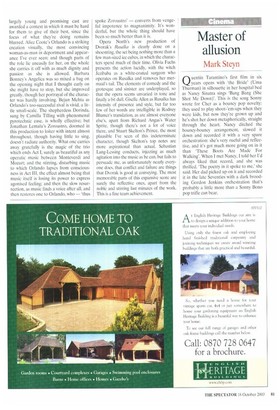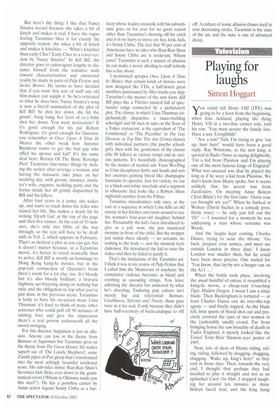Master of allusion
Mark Steyn Quentin Tarantino's first film in six years opens with the Bride' (Uma Thurman) in silhouette in her hospital bed as Nancy Sinatra sings 'Bang Bang (She Shot Me Down)'. This is the song Sonny wrote for Cher as a bouncy pop novelty: they used to play shoot-'em-ups when they were kids, but now they're grown up and he's shot her down metaphorically, straight through the heart. Nancy ditched the bouncy-bouncy arrangement, slowed it down and recorded it with a very spare orchestration: she's very rueful and reflective, and it's got much more going on in it than 'These Boots Are Made For Walking'. When I met Nancy, I told her I'd always liked that record, and she was thrilled. 'The poetry in it spoke to me,' she said. Her dad picked up on it and recorded it in the late Seventies with a dark brooding Gordon Jenkins orchestration that's probably a little more than a Sonny Bono pop trifle can bear. But here's the thing: I like that Nancy Sinatra record because she takes a bit of kitsch and makes it real. I have the vague feeling Tarantino likes it for exactly the opposite reason: she takes a bit of kitsch and makes it kitschier — 'What's kitschier than early Cher? Early Cher in a cover version by Nancy Sinatra!' In Kill Bill, the director goes to extravagant lengths to distance himself from the tentative nods toward characterisation and emotional reality he made in parts of Pulp Fiction and Jackie Brown. He seems to have decided that if you want that sort of stuff any old film-maker can supply it. So he's retreated to what he does best. Nancy Sinatra's song is now a literal summation of the plot of Kill Bill: he shot her down, she hit the groun', bang bang, her (sort of ex-) baby shot her down. You want motivation? If it's good enough for his pal Robert Rodriguez, it's good enough for Quentin: you remember in Once Upon A Time In Mexico the other week how Antonio Banderas wants to get the bad guy who offed his spouse and kid? It's the same deal here: Return Of The Basic Revenge Plot! Tarantino fine-tunes things by making the seeker after revenge a woman, and having the massacre take place on her wedding day, with groom, minister, minister's wife, organist, wedding party and the foetus inside her all grimly dispatched by Bill and his killers.
After four years in a coma, she wakes up, and starts to track down the folks who ruined her life. She makes a death list by writing 'Death List' at the top of the page and then five names. At the end of 93 minutes, she's only two fifths of the way through, so the rest will have to be dealt with in Vol. 2, which appears in February. That's as skeletal a plot as you can get, but it doesn't matter because, in a Tarantino movie, it's better to travel ironically than to arrive. Kill Bill is mostly an hommage to Hong Kong kung-fu movies, but in the pop-cult cornucopia of Quentin's brain there's room for a lot else, too. It's bloody but it's also bloody brilliant: a bravura highwire act breezing along on nothing but style and the obligation to top what you've just done in the previous scene. Tarantino is lucky to have his on-screen muse Uma Thurman: it's hard to think of many other actresses who could pull off 90 minutes of smiting foes and give the impression there's a real person underneath all the sword swinging.
For this director, happiness is just an allusion. Anyone can toss in the theme from Batman or Superman but Tarantino gives us the theme from The Green Homer. He makes superb use of 'The Lonely Shepherd', some Zamfir pipes-of-Pan gloop that's transformed into the most achingly beautiful incidental score. His sub-titles mimic Run-Run Shaw's Seventies kick flicks even down to the grammatical errors ('Whom in Okinawa made you this steel?'). He has a pointless cameo by Asian action legend Sonny Chiba as a bar
keep whose leaden crosstalk with his subordinate goes on for ever for no good reason other than Tarantino's showing off his catch and is in no hurry to move on: hey, look, kids, it's Sonny Chiba. The fact that 99 per cent of Americans have no idea who Run-Run Shaw and Sonny Chiba are is irrelevant. Whom cares? Tarantino is such a master of allusion he can make a movie alluding to stuff nobody has a clue about.
I mentioned apropos Once Upon A Time In Mexico that certain kinds of movies were now designed like CDs, a half-dozen great numbers punctuated by filler tracks you skip. Tarantino's the master of the new form: Kill Bill plays like a Thirties musical full of spectacular songs connected by a perfunctory plot. The climax, in which Uma Thurman singlehandedly dispatches a mace-wielding schoolgirl and 88 men in suits on the floor of a Tokyo restaurant, is the equivalent of 'The Continental' or 'The Piccolino' in The Gay Divorcee or Top Hat. The star (Uma) dances with individual partners (the psycho schoolgirl), then with the gentlemen of the chorus (the 88 killers) at various tempi and in various patterns. It's beautifully choreographed by the master of martial arts Yuen Wo-Ping as Uma decapitates limbs and heads and sets her enemies gushing blood like champagne fountains in operetta. Just for variety, we cut to a black-and-white interlude and a segment in silhouette that looks like a Robert Alton nightclub number from the Fifties.
Tarantino miscalculates only once, at the end of a sequence in which Uma kills an old enemy in her kitchen and turns around to see the woman's four-year-old daughter behind her. Presumably the kid's been introduced to give us a jolt: wow, she just murdered mommy in front of the child. But the moppet just stands there silently — no screams, no rushing to the body — and the moment feels dishonest. He introduced the kid to raise the stakes and then he failed to justify it.
That's the limitations of the Tarantino act. I think it was in my review of Pulp Fiction that I called him the Mantovani of mayhem: the cumulative violence becomes as bland and soothing as cascading strings. You leave admiring the director but unmoved by what he's directing. Enduring pop culture isn't merely hip and referential: Batman, Casablanca, Sylvester and Tweety, these guys were in it for real, if only because they didn't have half-a-century of back-catalogue to riff
off. A culture of ironic allusion chases itself in ever decreasing circles. Tarantino is the state of the art, and the state is one of advanced decay.



































































































 Previous page
Previous page